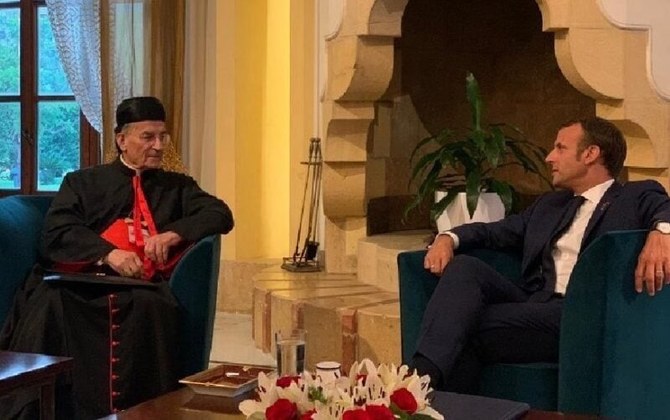BEIRUT: French President Emmanuel Macron has urged Lebanon’s divided politicians to save the country from “drowning in crises” by immediately electing a new president.
The French leader made his plea following a meeting with Maronite Patriarch Bechara Boutros Al-Rahi.
A French presidency statement, issued on Wednesday, said: “Macron and Al-Rahi expressed their deep concerns about the crisis in Lebanon and the paralysis of institutions, which has been exacerbated by the presidential vacuum for the past seven months.
“They agreed on the necessity of electing a president for the republic without delay.”
The statement quoted Macron as highlighting, “the need to keep Lebanon’s Christians at the heart of the sectarian and institutional balance of the Lebanese state.”
The president described Lebanon as a country “drowning in crises” adding that “the political deadlock has been an obstacle to the reforms without which there can be no recovery and lasting stability in Lebanon.”
Lebanon has entered its eighth month without being able to elect a president.
Hezbollah and its allies support the Marada Movement leader, Suleiman Frangieh, who is close to Syrian President Bashar Assad, but the largest parliamentary blocs oppose him in favor of their own candidate, former minister Jihad Azour, currently the director of the International Monetary Fund’s Middle East and Central Asia department.
Agence France-Presse quoted sources in Paris as saying that, “Al-Rahi and Macron discussed bridging the gap between Lebanese parties to agree on a presidential candidate and complete the electoral process.”
No political party has the necessary majority to elect its presidential candidate in parliamentary elections. Other parties refuse to bring a compromise candidate and because of the impasse, Parliament Speaker Nabih Berri has not set a date for what would be the 12th attempt to elect a president.
The country is struggling with economic, financial, and administrative crises that the caretaker government has been unable to resolve due to its inability to authorize decisions except in exceptional cases.
When the term of Lebanon’s central bank governor, Riad Salameh, is due to terminate at the end of July, another key vacancy will appear in the country.
Salameh is being investigated by several European countries and the Lebanese judiciary over allegations of corruption.
He appeared before the public prosecutor of the Court of Cassation, Judge Imad Qabalan, on Wednesday at the Palace of Justice in Beirut to be questioned about an arrest warrant recently issued against him by the German public prosecutor on charges of money laundering, forgery, and embezzlement.
Salameh’s son, Nadi, and Marwan Issa Al-Khoury, were also named in the German arrest warrant without any demand for their arrest, but rather a request that Salameh be held accountable for them.
The French judiciary has accused the central bank chief, his brother Raja Salameh, and his assistant Marianne Hoayek, of amassing a huge fortune in Europe, including money and real estate, through complex financial arrangements and embezzlement of large sums of Lebanese public funds. Salameh’s lawyers have filed an appeal against the charges.
The Lebanese judiciary is still awaiting a response from their French counterparts over the possibility of merging the European and Lebanese files on Salameh and prosecuting him in Lebanon, to avoid extradition.
Meanwhile, Raja Salameh failed to appear before a Paris court on Wednesday, citing through his legal representative in Lebanon medical reasons for his absence.














